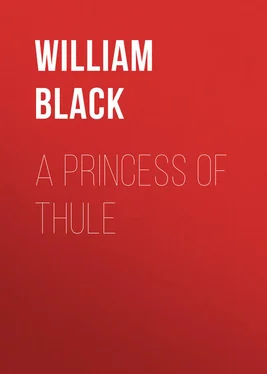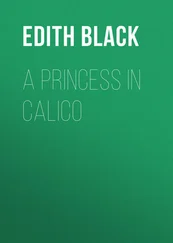William Black - A Princess of Thule
Здесь есть возможность читать онлайн «William Black - A Princess of Thule» — ознакомительный отрывок электронной книги совершенно бесплатно, а после прочтения отрывка купить полную версию. В некоторых случаях можно слушать аудио, скачать через торрент в формате fb2 и присутствует краткое содержание. Жанр: foreign_antique, foreign_prose, на английском языке. Описание произведения, (предисловие) а так же отзывы посетителей доступны на портале библиотеки ЛибКат.
- Название:A Princess of Thule
- Автор:
- Жанр:
- Год:неизвестен
- ISBN:нет данных
- Рейтинг книги:3 / 5. Голосов: 1
-
Избранное:Добавить в избранное
- Отзывы:
-
Ваша оценка:
- 60
- 1
- 2
- 3
- 4
- 5
A Princess of Thule: краткое содержание, описание и аннотация
Предлагаем к чтению аннотацию, описание, краткое содержание или предисловие (зависит от того, что написал сам автор книги «A Princess of Thule»). Если вы не нашли необходимую информацию о книге — напишите в комментариях, мы постараемся отыскать её.
A Princess of Thule — читать онлайн ознакомительный отрывок
Ниже представлен текст книги, разбитый по страницам. Система сохранения места последней прочитанной страницы, позволяет с удобством читать онлайн бесплатно книгу «A Princess of Thule», без необходимости каждый раз заново искать на чём Вы остановились. Поставьте закладку, и сможете в любой момент перейти на страницу, на которой закончили чтение.
Интервал:
Закладка:
The girl went away to seek counsel of Scarlett Macdonald, Duncan’s wife, and Mr. Mackenzie proceeded to walk up and down the big and half-lit chamber. Then he went to the cupboard, and put out on the table a number of tumblers and glasses, with two or three odd-looking bottles of Norwegian make, consisting of four semicircular tubes of glass, meeting at top and bottom, leaving the center of the vessel thus formed open. He stirred up the blazing peats in the fire-place. He brought down from a shelf a box filled with coarse tobacco, and put it on the table. But he was evidently growing impatient, and at last he put on his cap again and went out into the night.
The air blew cold in from the sea, and whistled through the bushes that Sheila had trained about the porch. There was no rain now, but a great and heavy darkness brooded overhead, and in the silence he could hear the breaking of the waves along the hard coast. But what was this other sound he heard, wild and strange in the stillness of the night – a shrill and plaintive cry that the distance softened, until it almost seemed to be the calling of a human voice? Surely those were words he heard, or was it only that the old, sad air spoke to him?
For Lochaber no more, Lochaber no more,
Maybe to return to Lochaber no more.
That was the message that came to him out of the darkness, and it seemed to him as if the sea and the night and the sky were wailing over the loss of his Sheila. He walked away from the house and up the hill behind. Led by the sound of the pipes, that grew louder and more unearthly as he approached, he found himself at length on a bit of high table-land overlooking the sea, where Sheila had had a rude bench of iron and wood fixed into the rock. On this bench sat a little old man, humpbacked and bent, and with long white hair falling down to his shoulders. He was playing the pipes – not wildly and fiercely, as if he were at a drinking-bout of the lads come home from the Caithness fishing, nor yet gaily and proudly, as if he were marching at the head of a bridal procession, but slowly, mournfully, monotonously, as though he were having the pipes talk to him.
Mackenzie touched him on the shoulder, and the old man started. “Is it you, Mr. McKenzie?” he said in Gaelic. “It is a great fright you have given me.”
“Come down to the house, John. The lads from Habost and Alister, and some more will be coming; and you will get a ferry good dram, John, to put wind in the pipes.”
“It’s no dram I’m thinking of, Mr. Mackenzie,” said the old man. “And you will have plenty of company without me. But I will come down to the house, Mr. Mackenzie – oh, yes, I will come down to the house – but in a little while I will come to the house.”
Mackenzie turned from him with a petulant exclamation, and went along and down the hill rapidly, as he could hear voices in the darkness. He had just got into the house when his visitors arrived. The door of the room was opened, and there appeared some six or eight tall and stalwart men, mostly with profuse brown beards and weather-beaten faces, who advanced into the chamber with some show of shyness. Mackenzie offered them a rough and hearty welcome, and as soon as their eyes had got accustomed to the light bade them help themselves to the whisky on the table. With a certain solemnity each poured out a glass and drank “ Shlainte! ” to his host as if it were some funeral rite. But when he bade them replenish their glasses, and got them seated with their faces to the blaze of the peats, then the flood of Gaelic broke loose. Had the wise little girl from Suainabost warned these big men? There was not a word about Sheila uttered. All their talk was of the reports that had come from Caithness, and of the improvements of the small harbor near the Butt, and of the black sea-horse that had been seen in Lock Suainabhal, and of some more sheep having been found dead on the Pladda Isles, shot by the men of the English smacks. Pipes were lit, the peat stirred up anew, another glass or two of whisky drunk, and then, through the haze of the smoke, the brown faces of the men could be seen in eager controversy, each talking faster than the other, and comparing facts and fancies that had been brooded over through solitary nights of waiting on the sea. Mackenzie did not sit down with them; he did not even join them in their attention to the curious whisky-flasks. He paced up and down the opposite side of the room, occasionally being appealed to with a story or question, and showing by his answers that he was but vaguely hearing the vociferous talk of his companions. At last he said, “Why the teffle does not John the Piper come? Here, you men – you sing a song, quick! None of your funeral songs, but a good brisk one of trinking and fighting.”
But were not nearly all their songs – like those of all dwellers on a rocky and dangerous coast – of a sad and sombre hue, telling of maidens whose lovers were drowned, and of wives bidding farewell to husbands they were never to see again? Slow and mournful are the songs that the Northern fishermen sing as they set out in the evening, with the creaking of the long oars keeping time to the music, until they get out beyond the shore to hoist the red mainsail and catch the breeze blowing over from the regions of the sunset. Not one of these Habost fishermen could sing a brisk song, but the nearest approach to it was a ballad in praise of a dark-haired girl, which they, owning the Nighean dubh , were bound to know. And so one young fellow began to sing, “Mo Nighean dubh d’fhas boidheach dubh, mo Nighean dubhna treig mi,” 1 1 “My black-haired girl, my pretty girl, my black-haired girl, don’t leave me.” “Nighean dubh” is pronounced “Nyean du.”
in a slow and doleful fashion, and the others joined in the chorus with a like solemnity. In order to keep time, four of the men followed the common custom of taking a pocket handkerchief (in this case an immense piece of brilliant red silk, which was evidently the pride of its owner), and holding it by the four corners letting it slowly rise and fall as they sang. The other three men laid hold of a bit of rope, which they used for the same purpose. “Mo Nighean dubh,” unlike most of the Gaelic songs, has but a few verses; and, as soon as they were finished, the young fellow, who seemed pleased with his performance, started another ballad. Perhaps he had forgotten his host’s injunction, perhaps he knew no merrier song, but at any rate he began to sing the “Lament of Monaltrie.” It was one of Sheila’s songs. She had sung it the night before in this very room, and her father had listened to her describing the fate of young Monaltrie as if she had been foretelling her own, and scarcely dared to ask himself if ever again he should hear the voice that he loved so well. He could not listen to the song. He abruptly left the room and went out once more into the cool night-air and the darkness. But even here he was not allowed to forget the sorrow he had been vainly endeavoring to banish, for in the far distance the pipes still played the melancholy wail of Lochaber.
Lochaber no more! Lochaber no more!
– that was the only solace brought him by the winds from the sea; and there were tears running down the hard gray face as he said to himself, in a broken voice, “Sheila, my little girl, why did you go away from Borva?”
CHAPTER II.
THE FAIR-HAIRED STRANGER
“WHY you must be in love with her yourself!”
“I in love with her? Sheila and I are too old friends for that!”
The speakers were two young men seated in the stern of the steamer Clansman as she ploughed her way across the blue and rushing waters of the Minch. One of them was a tall young fellow of three-and-twenty, with fair hair and light blue eyes, whose delicate and mobile features were handsome enough in their way, and gave evidence of a nature at once sensitive, nervous and impulsive. He was clad in light gray from head to heel – a color that suited his fair complexion and yellow hair; and he lounged about the white deck in the glare of the sunlight, steadying himself from time to time as an unusually big wave carried the Clansman aloft for a second or two, and then sent her staggering and groaning into a hissing trough of foam. Now and again he would pause in front of his companion, and talk in a rapid, playful, and even eloquent fashion for a minute or two; and then, apparently a trifle annoyed by the slow and patient attention which greeted his oratorical efforts, would start off once more on his unsteady journey up and down the white planks.
Читать дальшеИнтервал:
Закладка:
Похожие книги на «A Princess of Thule»
Представляем Вашему вниманию похожие книги на «A Princess of Thule» списком для выбора. Мы отобрали схожую по названию и смыслу литературу в надежде предоставить читателям больше вариантов отыскать новые, интересные, ещё непрочитанные произведения.
Обсуждение, отзывы о книге «A Princess of Thule» и просто собственные мнения читателей. Оставьте ваши комментарии, напишите, что Вы думаете о произведении, его смысле или главных героях. Укажите что конкретно понравилось, а что нет, и почему Вы так считаете.












